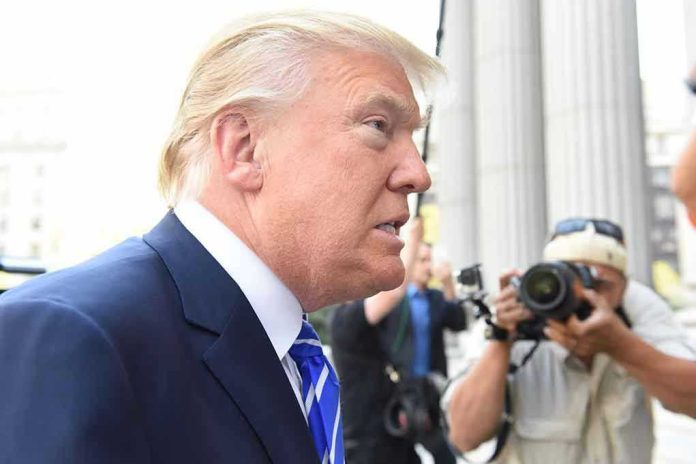
If a single Senate rule stands between millions of Americans and their paychecks, what happens when the president demands that rule be torched in broad daylight?
Story Snapshot
- Donald Trump has renewed his explosive call for Senate Republicans to permanently eliminate the filibuster amid a record-setting government shutdown.
- Senate Republican leaders, despite mounting pressure, have refused to change the rule—even as federal workers go unpaid and essential services grind to a halt.
- The standoff over health care funding has exposed the filibuster as both a procedural shield and a political sword in America’s legislative arena.
- The debate now puts not just policy, but the very character of the Senate and its traditions, in the crosshairs.
Trump’s Filibuster Gambit in the Eye of a Shutdown Storm
Donald Trump, never one to whisper his demands, detonated the filibuster debate again in early November 2025. Frustrated by a government shutdown that has stretched well past a month, Trump took to Truth Social and public appearances with a singular demand: end the filibuster now, or risk permanent legislative paralysis. His message landed in a capital already reeling from unpaid federal workers, grounded flights, and millions facing disruptions to food assistance. This is not the first time Trump has targeted the filibuster, but with the country’s economic gears grinding to a halt, his timing has never been so combustible.
The Senate filibuster, requiring a 60-vote supermajority to advance most legislation, has become the ultimate procedural chokehold. Designed to force compromise and prevent rash lawmaking, it now looms as the villain in a political showdown where neither party will blink. Trump’s supporters argue that ditching the filibuster is the only way to break the logjam and implement long-promised policies, from health care reform to voter ID laws. Detractors warn that scrapping the rule would transform the Senate into a high-speed partisan highway, where whichever party holds the barest majority could steamroll the minority at will.
Senate Republicans Stand Their Ground—For Now
Senate Republican leadership, still haunted by the ghost of past majorities lost, has so far refused Trump’s demand. Their rationale: today’s majority could be tomorrow’s minority, and a world without the filibuster means no procedural armor when the political winds shift. The Majority Leader, backed by a coalition of moderates, insists the rule is a bulwark against extremism and fleeting fads. Yet the pressure is mounting. As the shutdown’s toll grows—air travel snarled, paychecks missed, grocery bills unpaid—constituents are flooding congressional offices with desperate pleas for resolution. Some GOP senators, long skeptical of the filibuster, now see it less as a guardian of tradition and more as a hostage-taker in a crisis.
Trump’s critics on the right say his call is pure opportunism, designed to bulldoze longstanding Senate norms in pursuit of short-term gains. But his allies counter that Democrats will not hesitate to torch the filibuster when it suits their agenda. The rhetorical volleys from both camps have only deepened the standoff, with neither side showing signs of budging.
What’s at Stake: More Than Paychecks and Policy
The shutdown’s immediate impact is painfully clear. Federal workers, contractors, and millions relying on safety-net programs face growing uncertainty. SNAP recipients wonder if their next grocery run will be covered. TSA agents are calling in sick, threatening the smooth operation of airports nationwide. Government contractors and food retailers brace for ripple effects as government dollars dry up. These are the human consequences of a legislative standoff that, for all its procedural roots, is anything but abstract.
Trump Unleashes Fury, Calls to Ditch the Filibuster Nowhttps://t.co/gfSgXsCGxY
— RedState Updates (@RedStateUpdates) November 4, 2025
The longer-term stakes are less visible but even more profound. If Republicans heed Trump’s call and nuke the filibuster, the Senate’s character as a chamber of deliberation and minority rights could be fundamentally altered. The precedent is not without recent echoes: both parties have used the “nuclear option” to end the filibuster for nominations, but never for legislation itself. Ending it now would make future legislative swings more volatile and policy reversals more frequent, as each new majority flexes unchecked power. Political scientists warn that the Senate could become indistinguishable from the House, erasing the last vestiges of its cooling, deliberative function.
The Road Ahead: Pressure Builds, Uncertainty Reigns
Trump’s Truth Social broadsides and public rallies have kept the spotlight firmly on Senate Republicans. Yet, as of November 5, 2025, the filibuster stands, the government remains shuttered, and the American public grows weary. No sign has emerged that Republican leadership will cave, but the pressure cooker of public opinion and economic pain is heating up. Advocates for ending the filibuster insist this is a moment for bold action, while defenders warn that once the rule is gone, it cannot be easily resurrected. The question now is not just when the shutdown will end, but whether this latest crisis will finally break the filibuster’s hold—or only deepen Washington’s legendary gridlock.
Sources:
Scoop: Trump readying “living hell” for GOP senators over nuking filibuster



